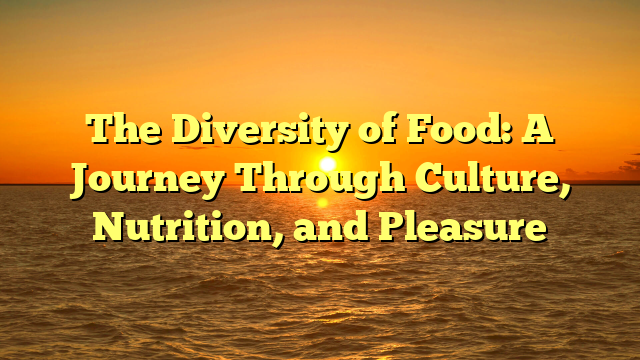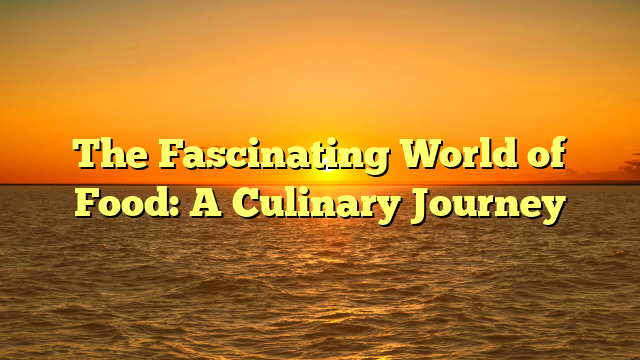
slot 4d is not merely a source of sustenance but a reflection of culture, tradition, and history.
From the simple grains that sustain us to the complex dishes that delight our taste buds,
food holds a special place in human life. It is central to social gatherings, religious rituals,
and even personal identity. In this article, we will explore the diversity of food, its nutritional
importance, and how it has evolved to become a vehicle for pleasure and expression.
The Evolution of Food
Historically, food has evolved significantly. Early humans primarily relied on hunting,
gathering, and farming to obtain their food. As civilization progressed, food became more
specialized and diverse. Early agricultural societies saw the domestication of plants and
animals, which allowed people to create more stable food supplies. This shift also led to the
development of unique culinary practices across different regions. The ancient Egyptians, for
example, were known for their sophisticated use of wheat and barley, while the Chinese
developed an intricate system of rice farming and noodle making that persists to this day.
The rise of trade routes, including the famous Silk Road, also played a significant role in the
dissemination of food across borders. Spices, fruits, and vegetables that were once
indigenous to particular regions were introduced to new lands, forever altering the global
food landscape. The introduction of tomatoes, potatoes, and chocolate to Europe from the
Americas, for instance, changed the course of European cuisine, while spices from the
Middle East and Asia influenced the flavors of African, Indian, and European dishes.
Cultural Influence on Food
Food is a powerful expression of cultural identity. Each region has its own distinct flavors,
cooking techniques, and eating habits. For example, the Mediterranean diet, characterized
by olive oil, fish, and fresh vegetables, is not only a nutritional model but a reflection of the
region’s historical reliance on agriculture and the sea. Similarly, Asian cuisines often focus
on balancing flavors like sweet, salty, sour, and bitter, a concept known as “umami,” which is
a central idea in culinary traditions such as Japanese, Chinese, and Thai food.
Food also plays a crucial role in social gatherings and celebrations. In Italy, meals are often
communal, where family and friends gather around the table to share multiple courses. In
India, food is a key component of religious ceremonies, and the preparation of dishes is
often done with great care and devotion. From the feasts of ancient Rome to the modern-day
holiday meals in various cultures, food has remained an integral part of marking significant
moments in life.
The Science of Nutrition
Beyond its cultural significance, food is essential for human health and well-being. The
science of nutrition is based on understanding how different nutrients in food contribute to
bodily functions. Nutrients can be categorized into macronutrients (carbohydrates, proteins,
and fats) and micronutrients (vitamins and minerals), each playing a vital role in maintaining
health.
Carbohydrates are the body’s primary source of energy, and they come from foods like
bread, rice, pasta, and fruits. Proteins, essential for tissue repair and growth, can be found in
meat, fish, eggs, and plant-based sources such as beans and lentils. Fats, often
misunderstood as unhealthy, are actually necessary for energy, hormone production, and the
absorption of fat-soluble vitamins. Healthy fats are found in foods like avocados, nuts, seeds,
and fish.
Vitamins and minerals, although needed in smaller amounts, are crucial for maintaining
functions such as immune response, bone health, and cellular repair. For example, vitamin
C, found in citrus fruits, supports the immune system, while calcium, found in dairy products,
is essential for bone health.
The modern emphasis on a balanced diet has led to the rise of food trends, with people
increasingly seeking to eat healthier, organic, or plant-based foods. The demand for low-carb
diets, gluten-free foods, and vegan options has given rise to an industry that caters to these
changing preferences, ensuring that individuals can meet their nutritional needs while
adhering to their personal values or health goals.
The Pleasure of Eating
While nutrition is important, the pleasure of eating is just as essential. Food is not only meant
to fuel our bodies but also to bring joy, comfort, and satisfaction. This is why the culinary
world is so diverse, with countless flavors, textures, and techniques designed to tantalize the
taste buds. From the rich, savory umami of a slow-cooked stew to the light, crisp freshness
of a salad, food offers a vast array of experiences.
The concept of “food as art” has gained recognition in recent years, especially with the rise
of gourmet cuisine and celebrity chefs. Chefs like Gordon Ramsay, Alice Waters, and René
Redzepi have elevated food preparation to a form of artistic expression, using ingredients in
innovative ways and focusing on aesthetics as much as taste. These chefs push the
boundaries of what food can be, challenging our perceptions and expanding our palates.
Eating is also an experience that involves all the senses. The smell of freshly baked bread,
the sight of a beautifully plated dish, the sound of sizzling meat on a grill, and the texture of a
perfectly ripe fruit all contribute to the enjoyment of food. The communal aspect of sharing
meals further enhances the experience, as food has the power to bring people together and
foster connections.
The Future of Food
As the world’s population continues to grow, the future of food will be shaped by the need for
sustainability, innovation, and adaptability. With climate change threatening traditional
agricultural practices, there is a growing interest in alternative food sources, such as
plant-based proteins, lab-grown meats, and insects. These innovations offer potential
solutions to global food security while reducing the environmental impact of food production.
At the same time, advancements in technology, such as vertical farming and precision
agriculture, promise to revolutionize how food is produced, ensuring that it is both abundant
and sustainable. The future of food will likely involve a greater emphasis on local and
seasonal eating, as well as an increasing awareness of the ethical implications of food
choices.
Conclusion
Food is an essential part of life that encompasses much more than just nutrition. It is a
reflection of culture, a source of pleasure, and a way to connect with others. As we continue
to explore the complexities of food, it is clear that our relationship with what we eat is
constantly evolving. From its cultural significance to its role in promoting health and
well-being, food will continue to play a central role in shaping our lives and the world around
us.




